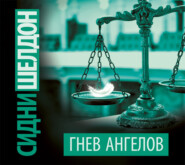По всем вопросам обращайтесь на: info@litportal.ru
(©) 2003-2025.
✖
The Other Side of Me
Настройки чтения
Размер шрифта
Высота строк
Поля
The manager shook his head. ‘That’s not what we’re looking—’
‘This could be a big hit,’ I implored him. ‘When love is gone, love is gone, the stars forget to glow, and we can hear much sadder songs than we were meant to know…’
The manager shrugged.
The stranger with the friendly smile was studying me. ‘Let me see that,’ he said.
I handed him the sheet of music and he scanned it.
‘That’s a damned good lyric,’ he commented. ‘What’s your name?’
‘Sidney Sheldon.’
He held out a hand. ‘I’m Max Rich.’
I knew his name. He had two popular songs playing on the air at that moment. One was ‘Smile, Darn Ya, Smile!’ and the other was a novelty song, ‘The Girl in the Little Green Hat.’
‘Have you had anything published, Sidney?’
The same trick question. I was crestfallen. ‘No.’ I was looking at the door.
He smiled. ‘Let’s change that. How would you like to work with me?’
I was stunned. This was exactly the opportunity I had dreamed of.
‘I—I’d love it,’ I said. I could hardly get the words out.
‘I have an office here, on the second floor. Why don’t you meet me there tomorrow morning, ten o’clock, and we’ll go to work.’
‘Great!’
‘Bring all the lyrics you have.’
I swallowed. ‘I’ll be there, Mr. Rich.’ I was in a state of euphoria.
When I told Sidney Rosenthal what had happened, he said, ‘Congratulations, big time! Max Rich can get anything published.’
‘I can show him some of your songs, too,’ I offered, ‘and—’
‘Get yourself started first.’
‘Right.’
That night Sidney Rosenthal and I had a celebratory dinner, but I was too excited to eat. Everything I had longed for was about to come true. Songs by Max Rich and Sidney Sheldon. The names sounded good together.
I had a feeling that Max Rich was a wonderful man to work with and I knew that some of my lyrics were going to please him.
I started to call Natalie and Otto, but I thought, I’ll wait until I’ve started.
As I got into bed that night, I thought, Why would Max Rich want to write with me when he could write with anybody? I’m a nobody. He’s just being kind. He’s overestimated what little talent I have and he’s going to be disillusioned. I’m not good enough to work with him. Out of nowhere, the black cloud had descended. All the publishers in the Brill Building have turned me down, and they’re professionals. They know talent. I have none. I would just make a fool of myself with Max Rich.
At ten o’clock in the morning, while Max Rich was waiting to collaborate with me in his office at the Brill Building, I was on a Greyhound bus, headed back to Chicago.
EIGHT (#ulink_19028d5c-2bda-510d-8983-80f21e5ee36a)
I returned to Chicago in March of 1937, a failure. Otto, Natalie and Richard were sympathetic about my lack of success as a songwriter.
‘They don’t know great songs when they hear them,’ Natalie said.
The economic situation at home had not improved. I reluctantly went back to work at the Bismarck checkroom. I managed to get a job during the day parking cars at a restaurant on the north side, in Rogers Park. My irrational mood swings continued. I had no control over them. I became ecstatic for no reason and depressed when things were going well.
One evening Charley Fine, my Stewart Warner mentor, and his wife Vera came to the apartment for dinner. For economical reasons we served a cheap, take-out dinner I had picked up at a neighborhood Chinese restaurant, but the Fines pretended not to notice.
During the evening, Vera said, ‘I’m driving to Sacramento, California next week.’
California. Hollywood. It was as though a door had suddenly opened for me. I thought of all the magical hours I had spent at the RKO Jefferson Theater, solving crimes with William Powell and Myrna Loy in After the Thin Man, riding with John Wayne in the covered wagon to California in The Oregon Trail, watching helplessly as Robert Montgomery terrorized Rosalind Russell in Night Must Fall, swinging through the trees with Tarzan in Tarzan Escapes, and having dinner with Cary Grant, Clark Gable and Judy Garland. I took a deep breath and said, ‘I’d like to drive you there.’
They all looked at me in surprise.
‘That’s very kind of you, Sidney,’ Vera Fine said, ‘but I don’t want to imp—’
‘It would be my pleasure,’ I said enthusiastically.
I turned to Natalie and Otto. ‘I’d like to take Vera to California.’
There was an uncomfortable silence.
We picked up the conversation after the Fines had left. ‘You can’t go away again,’ Otto said. ‘You just got back.’
‘But if I could get a job in Hollywood—’
‘No. We’ll find something for you to do here.’
I knew what there was for me to do in Chicago. Checkrooms and drugstores and parking cars. I had had enough of that.
After a brief silence, Natalie said, ‘Otto, if that’s what Sidney wants, we should give him a chance. I’ll tell you what. Let’s compromise.’ She turned to me. ‘If you don’t find a job in three weeks, you’ll come back home.’
‘It’s a deal,’ I said happily.
I was sure I could easily get a job in Hollywood. The more I thought about it, the more wildly optimistic I became.
This was finally going to be my big break.
Five days later I was packing, getting ready to drive Vera and her young daughter, Carmel, to Sacramento.
Richard was upset. ‘Why are you leaving again? You just got back.’
How could I explain to him all the wonderful things that were about to happen?

















